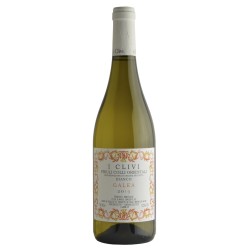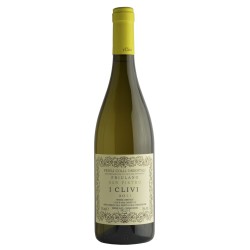- -10%
Serve at:
14°-16°C
Glass type
Schioppettino I Clivi 2022
CLIVISCXX
disponibile
€14.85
€16.50
-10%
Tax included
Time left
Schioppettino is a wine to which Mario Zanusso has been strongly attached since his childhood and it has recently joined the family of "I Clivi" wines.
I Clivi's pure version of Schioppettino comes from a vineyard nestled in the hills of Prepotto (in the province of Udine). The vineyard has a southeast-facing exposure and the vines have an average age of 30 years.
The soil is called "Ponca" or "Flysch". For locals, "Ponca" means a soil formed by the stratification of marl and sandstone formed with the succession of geological eras. Depending on the location, a higher content of sandstone, marls or carbonates can be found, and this aspect strongly characterizes the grapes and subsequent wines.
After the harvest, which is generally carried out in early October, the vinification is done in steel (only in recent vintages cement containers are also used) and it involves a short maceration of the skins with submerged cap. This means that the mass of skins is kept submerged in the fermenting must. This technique allows for greater extraction of substances such as polyphenols, anthocyanins and tannins. However, the maceration is quite short and the result is a red wine that is not too rich in color.
I Clivi
The love for wine comes unexpectedly from the Clivi: Ferdinando, an accountant, works in his father's tavern, in the lower province of Treviso, where the environment is a bit, the economic constraints lead him to accept a proposal work in the transport sector in West Africa. Until that moment he never managed to get involved in the wine of taverns, at the time far from the research and close to a decidedly acrid taste.
The journey to distant lands allows him to visit other countries and to open up to different cultures and above all to taste important wines and to understand that wine is not just that of osteria. In the mid-90s, from Africa, he plans to buy a vineyard in Friuli, his wife's homeland, and partly with only a small vineyard of two hectares of old vines on the southern slope of Monte Quarin.
Then comes Mario, Ferdinando's son who after studying Economics in Milan, returns to Friuli and in his spare time from the civil service, devotes himself to the vines: the concrete contact with the land after years of abstract studies becomes a beneficial substance that Mario will definitely fall in love with wine.
Learn vineyard techniques, then dedicate yourself to the cellar. These are the years in which the selected yeasts are very popular and the hints of banana and passion fruit are the aromas selected for everyone. He immediately understood that wine should not be created in a laboratory, but helped to express itself while maintaining its integrity. They cultivate Friulano, Malvasia, Verduzzo, Ribolla Gialla. They begin to vinify the grapes separately and without asking anyone's help they immediately have good intuitions, reducing the steps in winemaking, they do not clarify or torchiano. The most important intuition concerns the press: they realize that many people do an excellent job in the vineyard and in the cellar but the press is often too overgrown to oxidize the must and make too much dregs. They buy a German press and this will help to express their vision of wine to the best of their ability.
In 2018, in addition to the general economic crisis, the vines are cut down by blight and this results in a huge loss on production but at the same time this leaves, like any negative experience, a great legacy: this difficult moment will be the teaching of what they want to get from their wines . Lightness as a value of lightness and not as poverty, freshness as a departure from the buttery and hyper-concentrated wines, alcoholic moderation to follow the tradition of these lands.
Some would call them wines by subtraction. "Less is more" according to Mario and Ferdinando Zanusso.
The grapes are pressed after about 20 days of maceration. Bottling without filtration and clarification.
Winery products



















